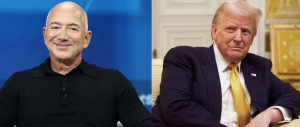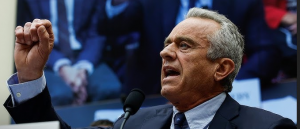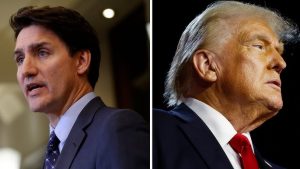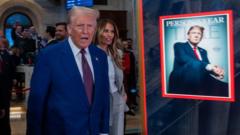As Prime Minister Keir Starmer seeks to rebuild relations with Europe, Donald Trump's recent election victory complicates Britain's diplomatic landscape, forcing a choice between the U.S. and the E.U.
Britain at a Crossroad: Choosing Between Trump and European Ties

Britain at a Crossroad: Choosing Between Trump and European Ties
Prime Minister Keir Starmer faces a pivotal decision amidst Trump's return to power and a desire to reconnect with Europe.
With the recent victory of Donald J. Trump in the American presidential election, Prime Minister Keir Starmer of Britain finds himself in a precarious position. His first notable diplomatic act as a leader was to join French President Emmanuel Macron in Paris to commemorate Armistice Day, marking a significant stride towards repairing ties with Europe after years of Brexit negotiations. However, this ambition appears to clash starkly with the implications of a Trump administration.
Trump, who holds a well-documented skepticism toward the European Union, presents a new challenge for Starmer's government as it aims to "turn a corner on Brexit." Starmer sees re-establishing connections with the continent as a pivotal opportunity to enhance Britain's economic livelihood. Yet, the geopolitical reality now poses a serious dilemma: Should the U.K. focus on mending relations with its most powerful ally, the United States, or prioritize its largest trading partner, the European Union?
This newly polarizing landscape is underscored by comments from Trump's economic advisors, who warn that stronger ties with Europe could jeopardize the potential for a lucrative free-trade agreement with the U.S. Stephen Moore, a senior advisor to Trump's campaign, articulated this sentiment by urging the British public to weigh their preference for alignment—whether to lean towards European norms or American values.
As Trump has been vocally supportive of Brexit, his administration's approach could greatly influence Britain’s diplomatic strategies. The decision that lies ahead for Starmer is not merely about trade; it symbolizes a broader ideological split that may define Britain's international relations for years to come. Balancing these complex dynamics will become an essential task for the Labour government, signaling a critical moment in British foreign policy.
Trump, who holds a well-documented skepticism toward the European Union, presents a new challenge for Starmer's government as it aims to "turn a corner on Brexit." Starmer sees re-establishing connections with the continent as a pivotal opportunity to enhance Britain's economic livelihood. Yet, the geopolitical reality now poses a serious dilemma: Should the U.K. focus on mending relations with its most powerful ally, the United States, or prioritize its largest trading partner, the European Union?
This newly polarizing landscape is underscored by comments from Trump's economic advisors, who warn that stronger ties with Europe could jeopardize the potential for a lucrative free-trade agreement with the U.S. Stephen Moore, a senior advisor to Trump's campaign, articulated this sentiment by urging the British public to weigh their preference for alignment—whether to lean towards European norms or American values.
As Trump has been vocally supportive of Brexit, his administration's approach could greatly influence Britain’s diplomatic strategies. The decision that lies ahead for Starmer is not merely about trade; it symbolizes a broader ideological split that may define Britain's international relations for years to come. Balancing these complex dynamics will become an essential task for the Labour government, signaling a critical moment in British foreign policy.




















